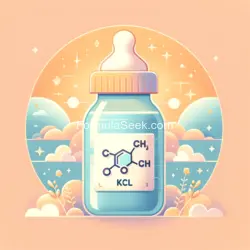
Potassium Chloride in Infant Formula: Understanding Its Importance
When it comes to infant nutrition, every ingredient in baby formula plays a critical role, and potassium chloride is no exception. This essential mineral compound serves multiple purposes in maintaining the health and development of infants. Understanding why potassium chloride is added to infant formula helps reassure parents about these products' safety and nutritional adequacy.
What is Potassium Chloride?
Potassium chloride (KCl) is a mineral salt of potassium and chlorine. In the body, potassium is a vital electrolyte necessary for several critical functions. It's commonly found in various foods and is essential for adults and infants.
The Role of Potassium in Infants
For infants, potassium plays several crucial roles:
Electrolyte Balance: Potassium helps maintain a healthy balance of fluids in the body. This is important for regulating blood pressure, hydration, and overall cellular function.
Muscle and Nerve Function: It aids in muscle contraction and the functioning of nerves. Proper muscle function is crucial for physical development in infants, including essential activities like sucking, swallowing, and general movement.
Heart Function: Potassium is vital for maintaining a healthy heart rhythm. Although heart issues are less common in infants, maintaining the right balance of electrolytes is still crucial for overall cardiac health.
Bone Health: Along with other minerals, potassium contributes to developing healthy bones, an essential aspect of infant growth.
Why Add Potassium Chloride to Infant Formula?
Human breast milk naturally contains potassium, vital for an infant's growth and development. When breastfeeding isn't possible, or supplementing is necessary, infant formula needs to replicate the nutritional profile of breast milk as closely as possible. This is where potassium chloride comes in.
Nutritional Balance: To mimic the electrolyte balance of breast milk, formula manufacturers add potassium chloride to ensure infants receive the necessary amount of potassium.
Preservation and Stabilization: Potassium chloride also stabilizes the formula, ensuring the product remains safe and effective throughout its shelf life.
Safety and Regulation
The inclusion of potassium chloride in infant formulas is strictly regulated. Health authorities like the U.S. Food and Drug Administration (FDA) and international bodies such as the World Health Organization (WHO) set guidelines for the safe levels of nutrients, including potassium, in infant formula.
Conclusion
In conclusion, potassium chloride is added to infant formula as an essential nutrient that plays multiple roles in an infant's early development. Its presence helps ensure that formula-fed infants receive comparable nutrition to breastfed ones. For parents, understanding the purpose and safety of ingredients like potassium chloride can provide peace of mind about their infant's nutritional needs.
Remember, when choosing an infant formula, it's always best to consult with a pediatrician to ensure it meets your baby's specific needs.



